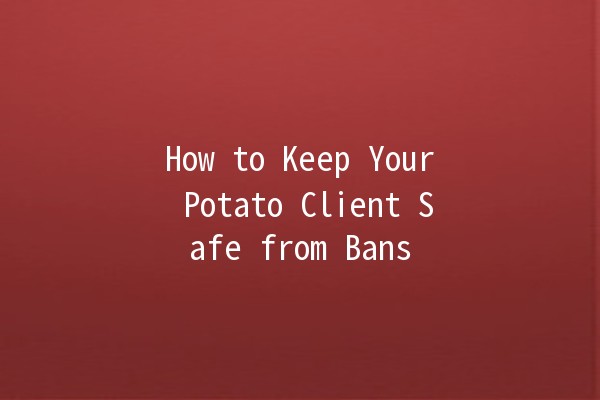In today's digital landscape, many users are turning to the Potato client for accessing restricted content or gaming platforms. However, this often brings the risk of account bans or IP blocks. If you're looking for practical advice on how to use the Potato client while minimizing the risk of getting banned, you've come to the right place. Below, we’ll cover essential strategies and productivity tips that can help you enhance your experience and keep your account safe.
Understanding Potato Client and Potential Risks
The Potato client is a versatile tool, allowing users to bypass geographical restrictions for games, streaming services, and more. However, using such tools can sometimes lead to unwanted scrutiny from service providers, potentially leading to bans. It’s crucial to approach this with informed strategies to enjoy the benefits while avoiding unnecessary risks.
Using a trustworthy Virtual Private Network (VPN) is one of the easiest and most effective methods to protect your Potato client from being banned.
Why Use a VPN?
A VPN masks your IP address and encrypts your internet traffic. This helps you maintain anonymity online, making it harder for service providers to identify your actual location and the tools you're using.

Practical Application
Frequent changes to your IP address can help you maintain a lower profile while using the Potato client.
Why Change IPs Often?
Constantly switching your IP address makes it challenging for algorithms to detect unusual or risky behavior associated with your account.
Practical Application
Keeping your Potato client and any associated tools updated is crucial for security and functionality.
Importance of Updates
Regular updates bring not only new features but also essential security patches. An outdated client may have vulnerabilities that could expose you to risks.
Practical Application
Securing your account credentials is essential to preventing unauthorized access that could lead to a ban.
Importance of Strong Credentials
Using strong, unique passwords minimizes the risk of your account being hacked, which could lead to repercussions by service providers.
Practical Application
Using shared accounts or credentials can increase the risk of getting banned since multiple users can trigger red flags.
Why Avoid Shared Accounts?
Multiple users accessing a single account can create patterns suggestive of misuse or abuse, raising the likelihood of bans.
Practical Application
Frequently Asked Questions
Q1: Can I use the Potato client without a VPN?
It's technically possible, but it’s highly discouraged. Without a VPN, your real IP address is exposed, making it easier for platforms to detect and ban you. A VPN adds essential anonymity that significantly reduces the risk.
Q2: What should I do if my Potato client gets banned?
If you notice your account banned, you can try appealing the ban to customer support. Provide them with any relevant information and be polite. In the meantime, consider creating a new account with a different email and following suggested security practices.
Q3: Are there any free VPNs that I can use with the Potato client?
While there are free VPNs available, they often come with limitations such as slower speeds, data caps, and a lack of security features. It’s generally recommended to invest in a reputable paid VPN for better protection and performance.
Q4: How can I tell if my VPN is protecting me effectively?
You can check if your VPN is working by using an IP checking website before and after connecting to the VPN. If the displayed IP changes, your VPN is functioning correctly.
Q5: Is it safe to use public WiFi with the Potato client?
Using public WiFi can be risky due to potential security vulnerabilities. Always connect to your VPN when using public networks to encrypt your traffic and protect your data.
Q6: How often should I change my password?
It’s advisable to change your passwords regularly, every three to six months, and immediately after any suspicious activity is detected. Using unique passwords for each account also adds a layer of security.
By following these strategies, you can maximize your security while enjoying the benefits of the Potato client. Always remember to stay informed, cautious, and proactive to prevent unwanted bans.